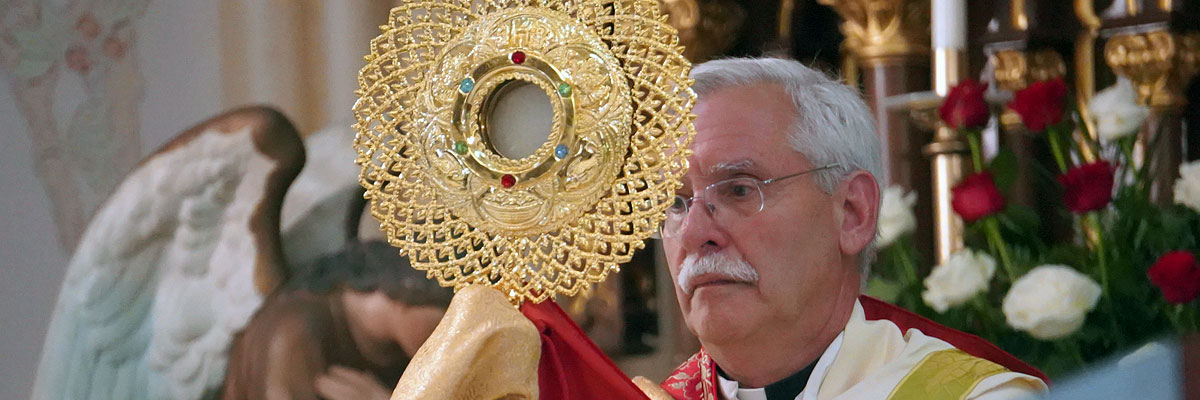Official Website of the
Catholic Diocese of Little Rock
14th Sunday in Ordinary Time, Year B 2021
Published: July 4, 2021
Bishop Anthony B. Taylor preached the following homily at St. Mary Church in Ponca City, Oklahoma on Sunday, July 4, 2021.

Bishop Taylor
Most of us look forward to going home from time to time for a visit, especially if we live a long way from where we were raised. I certainly look forward to my visits to Ponca City. In today’s Gospel we see that this was true for Jesus as well. He must have returned to Nazareth with eager anticipation, but that visit proved to be one of the most disappointing experiences of his life.
On the Sabbath he went to the synagogue and began to preach, much like I have come here to do, and am standing before you today. But while people here have always treated me really well, it wasn’t like that for Jesus that day. To them he was only “the carpenter, the son of Mary” and so they didn’t take his message seriously.
Jesus left there saying, “No prophet is without honor except in his native place, among his own kindred, and in his own house.” In other words, he felt dishonored by the very people that he knew best. Which raises the question, what kind of reception would have pleased him.
The people of Nazareth dishonored him with ridicule. We would never do that, knowing what we know about him. But we could dishonor him with empty words of praise unless we take his message seriously and apply it to our lives.
This is one area where we could end up thinking well of ourselves. From our vantage point in history, we can see Jesus as he really is — the Son of God, the Master Teacher, the Savior of the world. If he came to Ponca City, we’d have a parade, give him a testimonial dinner and talk our city commissioners into giving him the key to the city. The people of Nazareth didn’t know any of this and so they wrote him off as a mere carpenter posing as a man of letters.
But let me ask you: Do you really believe that we could flatter him with words of praise? Not on your life! People who have depth of character and bigness of heart are not looking for praise and adoration. Jesus watched the scribes and Pharisees as they decorated the graves of the prophets whom their fathers had killed, and he saw that both activities, as different as they might seem, were essentially the same. If a prophet is alive, you silence him with ridicule or even kill him. After he is dead, you worship him. Either way, you avoid the moral message he proclaims.
The prophets of the Old Testament, like Ezechiel in our first reading, were immune to flattery, and they would not be worshipped. The one thing they wanted was that their message be heard and heeded. Jesus stands in the line of all the great Hebrew prophets, and he — even less than they — could be placated with flattery. The people of Nazareth dishonored him with ridicule. We would never do that, knowing what we know about him. But we could dishonor him with empty words of praise unless we take his message seriously and apply it to our lives.
What Jesus is interested in is how we live our lives: in our families, at work, in our community, and on this July 4, as a nation. Is everything we do personally and as a country worthy of him? Jesus is especially interested in the quality of our relationships. He would want to know how a father treats his children and how a husband treats his wife.
He would be vitally interested in the poor of the community and in what you are doing to help them, like the Mission on South Avenue here in Ponca City, and Peach Tree Landing, and the Opportunity Center. He might ask us about the aged and what we are doing to make their lives more livable, especially people who are more or less abandoned in our nursing homes. He would want to know about our attitude toward people of different races. He might ask to visit the county jail or a drug treatment center and ask us what plans we have for helping those people get their lives back on track.
Jesus believed in some things so deeply that he was willing to die for them. People with that kind of conviction cannot be flattered with words of praise. The only kind of honor Jesus wants is for us to take his message to heart and apply it to our lives. “No prophet” he said, “is without honor except in his native place, among his own kindred and in his own house.”
What about your house, how much honor is he finding there? And on this July 4, I could give you a long list of problematic areas of public policy, all the way from abortion to immigration to care for the weak and vulnerable: how much honor does he receive through what we do as a nation?









